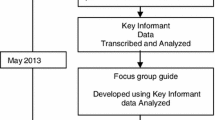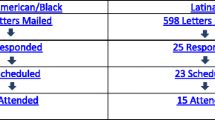Abstract
The increased risk of genetic cancer mutations for Ashkenazi Jews is well known. However, little is known about the cancer-related health behaviors of a subset of Ashkenazi Jews, Orthodox Jews, who are a very religious and insular group. This study partnered with Rabbinical leadership and community members in an Orthodox Jewish community to investigate barriers to cancer screening in this community. Orthodox Jewish women were recruited to participate in focus groups designed to elicit their perspectives on barriers to cancer screening. A total of five focus groups were conducted, consisting of 3–5 members per group, stratified by age and family history of cancer. Focus groups were audio recorded and transcribed. Transcripts were coded using conventional content analysis. The resulting themes identified as barriers to cancer screening were: preservation of hidden miracles, fate, cost, competing priorities, lack of culturally relevant programming, lack of information, and fear. These results provide a unique perspective on barriers to cancer screening in a high risk but understudied population. Findings from this study may serve to inform culturally appropriate cancer education programs to overcome barriers to screening in this and other similar communities.
Similar content being viewed by others
References
Siegel, R., Naishadham, D., & Jemal, A. (2013). Cancer statistics, 2013. CA: A Cancer Journal for Clinicians, 63(1), 11–30.
Breast Cancer Linkage Consortium. (1999). Cancer risks in BRCA2 mutation carriers. Journal of the National Cancer Institute, 91(15), 1310–1316.
Greenwood, C. M., et al. (2010). How old is this mutation?—A study of three Ashkenazi Jewish founder mutations. BMC Genetics, 11, 39.
Cooperman, A., Smith, G.A., Hackett, C., & Kuriakose, N. (2013). A portrait of Jewish Americans: Findings from a Pew Research Center Survey of US Jews. Washington, DC: Pew Research Center.
Cohen, S. M., Ukeles, J. B., & Miller, R. (2012). Jewish community study of New York: 2011 comprehensive report. New York: UJA-Federation of New York.
Tkatch, R., et al. (2013). Breast Cancer incidence rates among Orthodox Jewish women. Journal of Immigrant and Minority Health. doi:10.1007/s10903-013-9822-8.
Albert, S. M., Harlap, S., & Caplan, L. (2004). Cancer screening among older women in a culturally insular community. Preventive Medicine, 39(4), 649–656.
Baron-Epel, O., Friedman, N., & Lernau, O. (2008). Validity of self-reported mammography in a multicultural population in Israel. Preventive Medicine, 46(6), 489–491.
Pfeffer, N. (2004). Screening for breast cancer: Candidacy and compliance. Social Science and Medicine, 58(1), 151–160.
Freund, A., Cohen, M., & Azaiza, F. (2013). The doctor is just a messenger: Beliefs of ultraorthodox Jewish women in regard to breast cancer and screening. Journal of Religion and Health. doi:10.1007/s10943-013-9695-0.
Shmueli, A., & Tamir, D. (2007). Health behavior and religiosity among Israeli Jews. The Israel Medical Association Journal, 9(10), 703–707.
Deuteronomy. 4:15.
Garcia Fernandez, A., et al. (2014). Mortality and recurrence patterns of breast cancer patients diagnosed under a screening programme versus comparable non-screened breast cancer patients from the same population: Analytical survey from 2002 to 2012. Tumour Biology, 35(3), 1945–1953.
Noar, S. M., et al. (2014). Public figure announcements about cancer and opportunities for cancer communication: A review and research agenda. Health Communication, 29(5), 445–461.
Hurley, R. J., Riles, J. M., & Sangalang, A. (2014). Online cancer news: Trends regarding article types, specific cancers, and the cancer continuum. Health Communication, 29(1), 41–50.
Kreuter, M. W., et al. (2003). Sociocultural characteristics and responses to cancer education materials among African American women. Cancer Control, 10(5 Suppl), 69–80.
Kreuter, M. W., et al. (2004). Responses to behaviorally vs culturally tailored cancer communication among African American women. American Journal of Health Behavior, 28(3), 195–207.
Holt, C. L., Lukwago, S. N., & Kreuter, M. W. (2003). Spirituality, breast cancer beliefs and mammography utilization among urban African American women. Journal of Health Psychology, 8(3), 383–396.
Harper, F. W., et al. (2013). “It’s up to you and God”: Understanding health behavior change in older African American survivors of colorectal cancer. Translational Behavioral Medicine, 3(1), 94–103.
Mor, P., & Oberle, K. (2008). Ethical issues related to BRCA gene testing in orthodox Jewish women. Nursing Ethics, 15(4), 512–522.
Mark, N., & Roberts, L. (1994). Ethnosensitive techniques in the treatment of the Hasidic patient with cancer. Cancer Practice, 2(3), 202–208.
Israel, B. A., et al. (2001). Community-based participatory research: Policy recommendations for promoting a partnership approach in health research. Education for Health (Abingdon), 14(2), 182–197.
Balazs, C. L., & Morello-Frosch, R. (2013). The three R’s: How community based participatory research strengthens the rigor, relevance and reach of science. Environmental Justice, 6(1), 9–16.
Israel, B. A., et al. (2006). Challenges and facilitating factors in sustaining community-based participatory research partnerships: Lessons learned from the Detroit, New York City and Seattle Urban Research Centers. Journal of Urban Health, 83(6), 1022–1040.
Coleman-Brueckheimer, K., & Dein, S. (2011). Health care behaviours and beliefs in Hasidic Jewish populations: A systematic review of the literature. Journal of Religion and Health, 50(2), 422–436.
Coleman-Brueckheimer, K., Spitzer, J., & Koffman, J. (2009). Involvement of Rabbinic and communal authorities in decision-making by haredi Jews in the UK with breast cancer: An interpretative phenomenological analysis. Social Science and Medicine, 68(2), 323–333.
Kitzinger, J. (1995). Qualitative research. Introducing focus groups. BMJ, 311(7000), 299–302.
Andrews, C. S. (2011). Defining and exploring modesty in Jewish American women. Journal of Religion and Health, 50(4), 818–834.
Krueger, D. L. M.a. R. A. (1997). Focus group kit (p. 692). Beverley Hills: Sage.
Q.I.P. Ltd. (2012). NVivo qualitative data analysis software.
Hsieh, H. F., & Shannon, S. E. (2005). Three approaches to qualitative content analysis. Qualitative Health Research, 15(9), 1277–1288.
Bowen, D. J., et al. (2003). Jewish identity and intentions to obtain breast cancer screening. Cultural Diversity and Ethnic Minority Psychology, 9(1), 79–87.
Acknowledgments
This project was supported in part by National Institutes of Health/National Cancer Institute Grant U54 CA153606 (T. Albrecht, PI), The Jewish Fund, and services conducted by the Behavioral Field and Research Core supported in part by NCI Center Grant (P30CA22453) to the Karmanos Cancer Institute, Wayne State University School of Medicine.
Author information
Authors and Affiliations
Corresponding author
Rights and permissions
About this article
Cite this article
Tkatch, R., Hudson, J., Katz, A. et al. Barriers to Cancer Screening Among Orthodox Jewish Women. J Community Health 39, 1200–1208 (2014). https://doi.org/10.1007/s10900-014-9879-x
Published:
Issue Date:
DOI: https://doi.org/10.1007/s10900-014-9879-x




